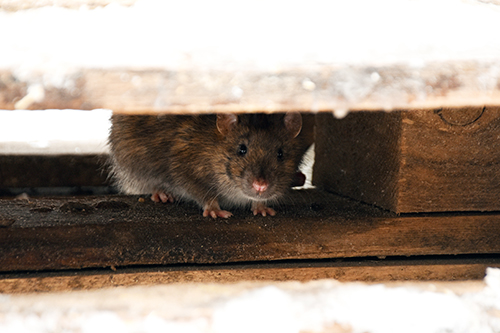Rodents Be Gone!
Jan 18, 2023

The cooler temperatures drive many animals into hibernation, but rats and mice stay active year-round. They generally infest old buildings and cluttered areas, but they can even be a problem in newer homes and clean conditions as well. And, of course, rats and mice have long been a problem on farms where food is plentiful and nesting sites are both numerous and hard to eliminate.
There are four major problems caused by rats and mice:
There are two main solutions to solve rodent problems:
When using traps, strategically place them in areas that are frequented by rodents such as along the base of walls, under cabinets, and in attic crawl spaces. Snap traps and glue traps are often preferred over poison baits for a couple of reasons. Poison baits, if carelessly used, can harm children, pets, and non-target animals. Sick rodents may also escape to areas between walls or under floors where they die and decompose, causing odor and insect problems.
Poison baits are mainly composed of compounds called anticoagulants. Their mode of action involves reducing the ability of blood to clot so that exposed animals bleed internally and die. Anticoagulants are cumulative poisons and act relatively slowly — rodents typically die several days after initial and continual feeding on the bait. This slow process is usually necessary to prevent rodents from becoming bait shy.
While colder weather tends to drive rodents indoors, they can be a nuisance all year long. By keeping the traps and/or baits available year-round, you will keep pests at bay and therefore reduce the chance of damage and contamination. Your local Co-op offers a variety of traps and poison baits and can help you choose the right one for your home pest control needs.
For more content like this, check out the latest issue of The Cooperator.
There are four major problems caused by rats and mice:
- They will invade any available food source, such as pet food or livestock feed, and contaminate it with urine and excrement.
- They gnaw into materials such as paper, books, wood, or upholstery and use them as nest material. They also gnaw plastic, cinder blocks, soft metals such as lead and aluminum, and wiring, which may cause a fire hazard.
- They transmit many kinds of diseases because of the parasites they carry such as fleas, mites, and worms.
- They can damage ornamental plants by burrowing among the roots or feeding on new growth or twigs. They also eat some garden vegetables such as corn and squash.
There are two main solutions to solve rodent problems:
- Traps
- Poison baits
When using traps, strategically place them in areas that are frequented by rodents such as along the base of walls, under cabinets, and in attic crawl spaces. Snap traps and glue traps are often preferred over poison baits for a couple of reasons. Poison baits, if carelessly used, can harm children, pets, and non-target animals. Sick rodents may also escape to areas between walls or under floors where they die and decompose, causing odor and insect problems.
Poison baits are mainly composed of compounds called anticoagulants. Their mode of action involves reducing the ability of blood to clot so that exposed animals bleed internally and die. Anticoagulants are cumulative poisons and act relatively slowly — rodents typically die several days after initial and continual feeding on the bait. This slow process is usually necessary to prevent rodents from becoming bait shy.
While colder weather tends to drive rodents indoors, they can be a nuisance all year long. By keeping the traps and/or baits available year-round, you will keep pests at bay and therefore reduce the chance of damage and contamination. Your local Co-op offers a variety of traps and poison baits and can help you choose the right one for your home pest control needs.
For more content like this, check out the latest issue of The Cooperator.